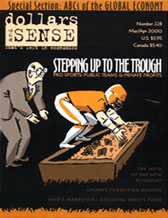Saint Greenspan?
This article is from the March/April 2000 issue of Dollars and Sense: The Magazine of Economic Justice available at http://www.dollarsandsense.org
This article is from the March/April 2000 issue of Dollars & Sense magazine.

So extravagantly has the media been lauding Alan Greenspan, one would almost think he had been nominated for sainthood rather than a fourth term as chair of the Federal Reserve. To hear the business press tell it, Saint Greenspan has single-handedly engineered both the U.S. economic boom and the soaring U.S. stock market.
Yet not only is Greenspan not responsible for recent U.S. prosperity, but much of what is wrong in the world economy today can be traced to his door. Under his leadership, the Fed (which controls the key interest rate that banks pay to obtain funds) has placed the vested interests of banks and bondholders above the interests of workers or even the stability of the economy. Since Greenspan became chair in 1987, the Fed has repeatedly indicated that its first and foremost goal is to raise interest rates as high as possible, whenever possible, so long as bank profits aren't endangered.
Unlike his predecessor Paul Volcker, Greenspan has not yet toppled the economy in order to safeguard the wealth of the financial elite, but he has certainly come close. Since his premature reappointment, media retrospectives have cited Greenspan for wisely cutting interest rates during the recession of 1991. They fail to note, though, that it was tight money and high rates that had done the economy in. Former president Bush still blames Greenspan for the recession that scuttled his reelection bid.
The recession in 1991 set off waves of bank failures, which forced the Fed to cut interest rates in 1992 and 1993. No sooner had the large banks recovered, though, than the Fed raised interest rates once more, doubling short-term rates over the course of 1994. Soon real (inflation-adjusted) interest rates reached historic highs. Higher mortgage and debt service payments sent national income flowing to the finance sector—by mid-decade, New York had the most unequal income distribution of all the 50 states—and set the stage for nearly four years of declining wages and stagnant family incomes.
How quickly we seem to have forgotten that it was Greenspan who, during much of the 1990s, insisted that an unemployment rate of 6% was "natural," Greenspan who threatened to hike interest rates each time an unemployed worker got a job. On Greenspan's watch, the Fed has not only willfully ignored its legal mandate to promote full employment, it has even quietly pushed legislation that would eliminate altogether its statutory obligation to workers.
Greenspan's craven lobbying on behalf of financial markets, and his stubborn refusal to accomodate wage growth, have emboldened conservatives at the Fed. Fed policy discussions today revolve not around whether to raise rates, but when and by how much. Further increases in interest rates are presented as so inevitable, that the Fed no longer even bothers trying to justify them. When he raised interest rates in 1994, Greenspan was fond of blaming the high rates on Clinton and the federal budget deficit. But when Clinton declared this past year that the largest surplus in history would surely cause interest rates to fall, Greenspan's Fed announced the first of four interest rate increases.
Greenspan's inattention to anything beyond the parochial needs of financiers has caused harm throughout the world. Greenspan was a forceful advocate of financial deregulation and "liberalization" of international monetary policies that so damaged the indebted countries of the third world. The discredited policies endorsed by Greenspan and pushed by the IMF fueled the destructive financial speculation that shook world markets just two years ago. While Greenspan is praised for cutting rates in 1998 to avert a financial meltdown in the US, he lost no time in pushing them back up again this past year. These high interest rates have greatly exacerbated the problems of indebted countries, whose interest costs vary directly with short-term U.S. interest rates. Thanks in no small part to Greenspan, most of the emerging markets are still reeling under crushing debt burdens and punishing interest rates.
Since Greenspan's reappointment, the Fed announced a further interest rate increase and is widely expected to raise rates aggressively in 2000, a boon to Wall Street, but a bust to virtually everyone else. We'd better start praying that Saint Greenspan doesn't derail the economy.
